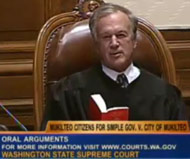5/25/2011
Washington Supreme Court Considers Anti-Camera Referendum BattleWashington Supreme Court takes on issue of red light camera bans as Longview and Monroe citizens demand a vote on the issue.

Justices of the Washington State Supreme Court on Tuesday openly questioned whether it was proper for a city and a photo enforcement contractor to thwart the initiative process on the issue of traffic cameras. The question has become increasingly relevant as activists in the cities of Longview and Monroe on Monday turned in signatures they believe will be sufficient to call for a vote on banning red light cameras and speed cameras. Less than a week ago, a Chelan County Superior Court judge ruled that activists in the city of Wenatchee were forbidden from attempting to bring the question of cameras to the voters (view ruling).
Justice James M. Johnson suggested the particular vote that took place last year in Mukilteo was protected by the state's version of the First Amendment. Johnson even suggested that the initiative proponent's lawyer was not going far enough in his legal arguments.
"I was surprised that you did not cite Article 1 Section 4 of the state constitution, reading as follows: 'The right of petition and of the people peaceably to assemble... shall never be abridged,'" said Johnson. "The constitution says the right of petition shall never be abridged."
Mukilteo city officials ultimately conceded that the petition could not be blocked (especially after the high court weighed in), but they refused to concede that the question of red light cameras was a matter subject to the referendum process. So city attorney Angela Belbeck claimed there was no choice but to make the vote advisory only. Justice Gerry L. Alexander insisted that was a "debatable" point.
"I'm concerned the city can undercut the initiative process," Alexander said. "When citizens come in with signatures for an initiative and the city just says, 'we'll just call this an advisory ballot.'"
Alexander went on to complain that "we don't really have the adversarial process" in the case because an American Traffic Solutions front group sued the city of Mukilteo, and both sides are in favor of red light cameras. Other justices seemed concerned that the city pretended in the ballot language and in the voter guide that the vote was on an actual initiative. No material made mention that the vote was merely advisory in nature.
"I find it very puzzling that this was presented as an initiative," Justice Charles K. Wiggins said. "Why didn't it go on the ballot as an initiative? There was an initiative petition presented to the city council which could either enact the law or put it on the ballot. They didn't do either one."
Meanwhile, in the city of Longview activists Mike Wallin and Josh Sutinen turned in 3628 signatures (30 percent more than necessary) on an initiative petition to give voters the chance to decide whether to outlaw red light cameras and speed cameras. In Monroe, Ty Balascio and the group Seeds of Liberty handed in 1175 signatures on the first-ever initiative petition filed in the city. The groups initially thought it would take six months to gather the required support, but each reached the goal in just four. Signature collection is still active in Bellingham and Redmond.


